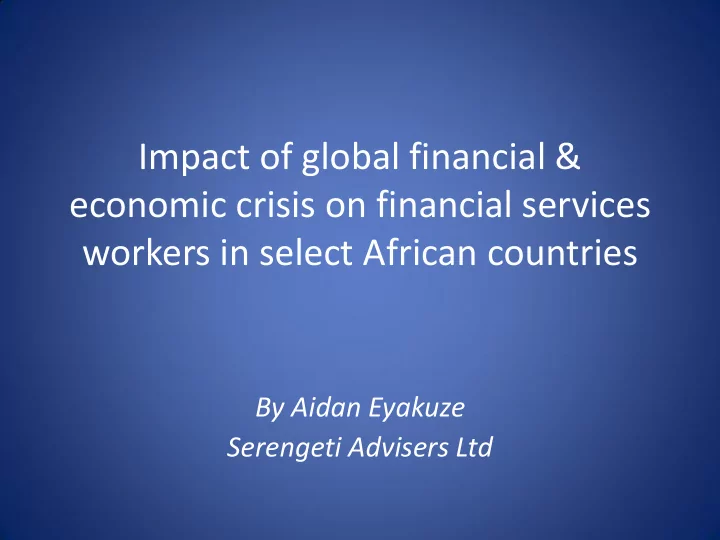

Impact of global financial & economic crisis on financial services workers in select African countries By Aidan Eyakuze Serengeti Advisers Ltd
Outline 1. Study Objectives 2. Structure of financial sector 3. Financial sector employment & trade unions 4. Global Crisis: Impact & Response 5. Impact on financial sector employment & social dialogue 6. Observations
Study Background & Objectives • Background: – Geneva (Feb 24- 25): ILO asked to ‘collect data, monitor, analyze and disseminate information on trends in employment in the finance sector…’ • Objectives: – Rapid assessment of effects of global economic crisis on financial services sector in Egypt, Kenya Nigeria, South African and Tanzania; – Document impact on financial sector employment; – Analyse effectiveness of measures to cope with fallout on employment in the sector
Structure of the financial sector Commercial Banking Insurance Sector 3 Private State Owned 10 6 4 3 83 General Life Composite 0 42 34 32 31 24 113 19 15 8 7 5 0 7 5 23 20 13 13 Egypt Kenya Nigeria South Africa Tanzania Egypt Kenya Nigeria South Africa Tanzania Microfinance Institutions 1,400 898 34 13 - Egypt Kenya Nigeria South Africa Tanzania
Financial sector employment… Financial Sector Employment 1,687,000 Earliest (date) Pre-crisis Share of total employment Egypt (2008): 1% Kenya: n/a 922,000 Nigeria (2007): 0.56% S Africa (2008) 13% Tanzania (2006): 0.1% 303,000 270,000 240,000 188,000 25,498 26,501 21,657 17,497 Egypt (Dec 02) Kenya (Dec 07) Nigeria (Dec 03) S Africa (Dec 01) Tanzania (Dec 01)
…and Trade Unions Country Trade Union(s) Members (latest) National Trade Union of Banks, Insurance Egypt and Financial Affairs 100,000 (2008) (NTUBIFA) Banking, Insurance and Finance Union Kenya 2,972 (2000) (BIFU) Association of Senior Staff of Banks, Insurance and Financial Institutions (ASSBIFI) Nigeria no data National Union of Banks, Insurance and Financial Institutions Employees (NUBIFIE) South African Society of Bank Officials South Africa 59,000 (2009) (SASBO) Tanzania Union of Industrial and Tanzania Commercial Workers 38,000 (2006) (TUICO)
Global Crisis: Impact & Response Country Impact Response • Decreased activity in tourism, transport, Stimulus package: USD 2.7 bn (2008/09) and finance, real estate; USD 1.8 bn (2009/10) Egypt • Drop in portfolio investment flows, CASE 30 Subsidies, investments in SMEs, infrastructure index lost 56% but recovered in 2009 upgrading Stimulus package: USD 1.03 bn rural • GDP growth fell from 7.1% (2007) to 1.7% development, and constituency resilience plus Kenya (2008), and projected at 3% (2009) a USD 3.1 bn ‘Marshall Plan’ for the longer • Decline in FDI, remittances, tourism, exports terms • Sharply lower oil revenues as global demand and oil prices dropped; international reserves USD 3.9 bn bailout for nine banks Nigeria fell by USD 19bn in 9 months USD 2 bn stimulus (from excess crude account) • Stock market lost 46% • (Homegrown) banking crisis! • Economy contracted by 6.4% in Q1 09 and 3% USD 101 bn stimulus package for social in Q2 09; spending, infrastructure, housing and South Africa • 770,000 jobs lost led by manufacturing and education mining Looser monetary policy • Economic growth slows from over 7% to 4-5% USD 1.7 bn stimulus, mostly to protect • FDI reduction to USD 670m (2009) from USD banking system from commodity-based loans Tanzania 744m (2008) going sour • Decline in tourism and export revenues
Impact on financial sector employment & social dialogue Country Job losses Social Dialogue Egypt No reports or evidence of any None reported 134 of which 85 completed, 49 planned Kenya None reported (Source: FKE, May 2009) Militant language by ASSBIFI and Several thousand to 72,000 job cuts; NUBIFIE against lay-offs, but little Nigeria mostly middle management & support staff evidence of action as banks (Source: online papers and news reports) proceed with lay-offs Net gain of 50,000 jobs (despite loss of 28,000 South jobs in April-Sep 2009) None reported Africa (Source: Statistics South Africa) 262 job cuts (94% at four large global banks) Tanzania None reported Net gain of 360 in commercial banking (Source: Serengeti Advisers database)
Observations • Weak integration to global financial markets protected Africa’s financial sectors maintain caution with respect to opening up • Financial sector employment accounts for a tiny share (0.1 – 1.0%) of total employment easy to ignore. • Information on financial sector employment (numbers, trade unions) is patchy and dated ILO may want to support work to update and maintain it
Thank you for your attention Discussion
Recommend
More recommend